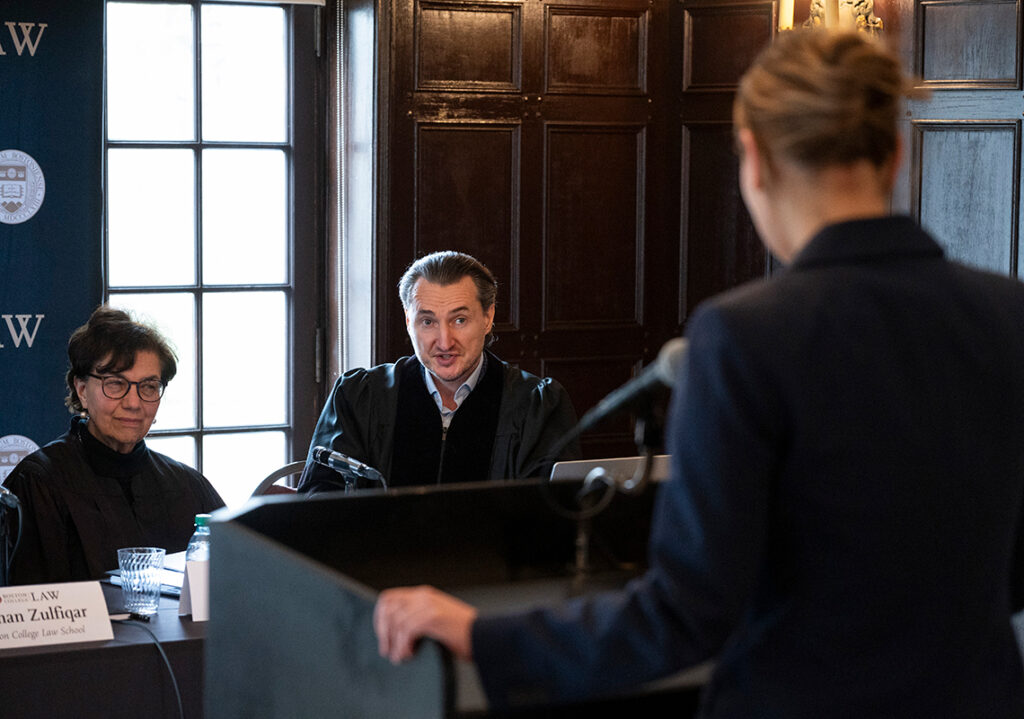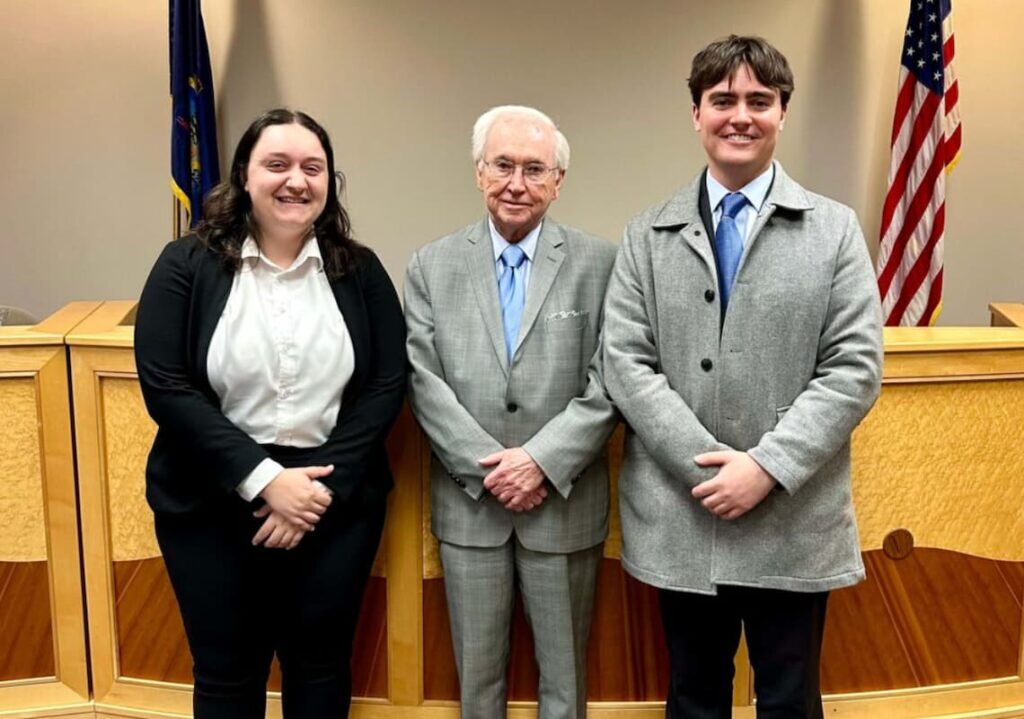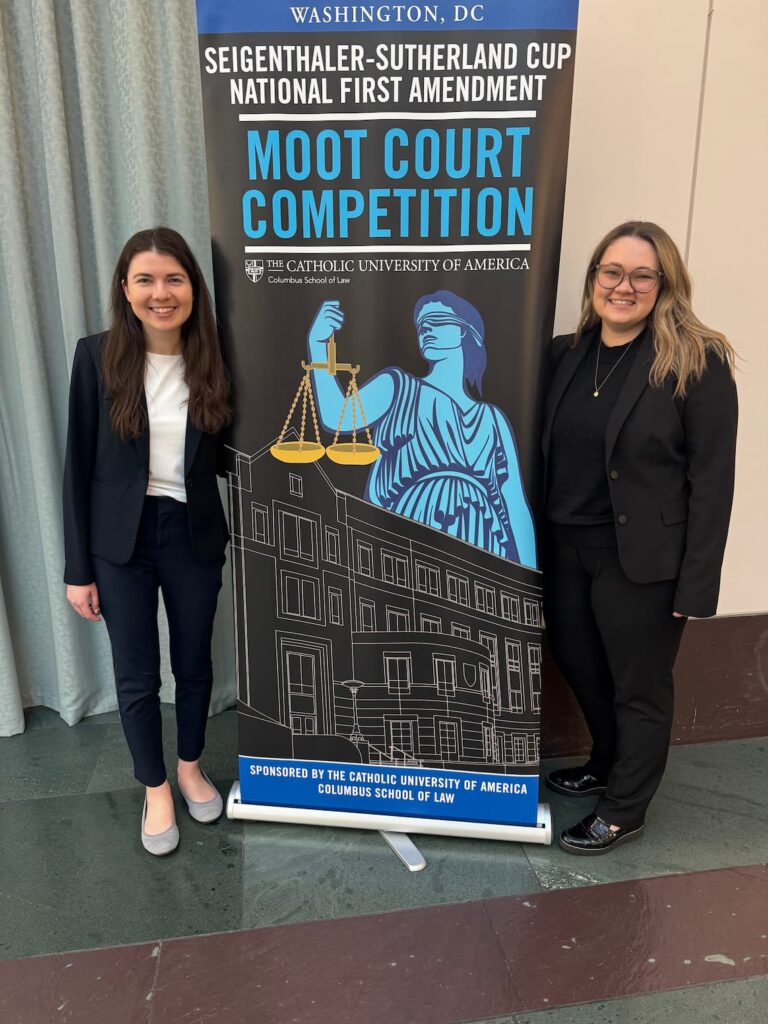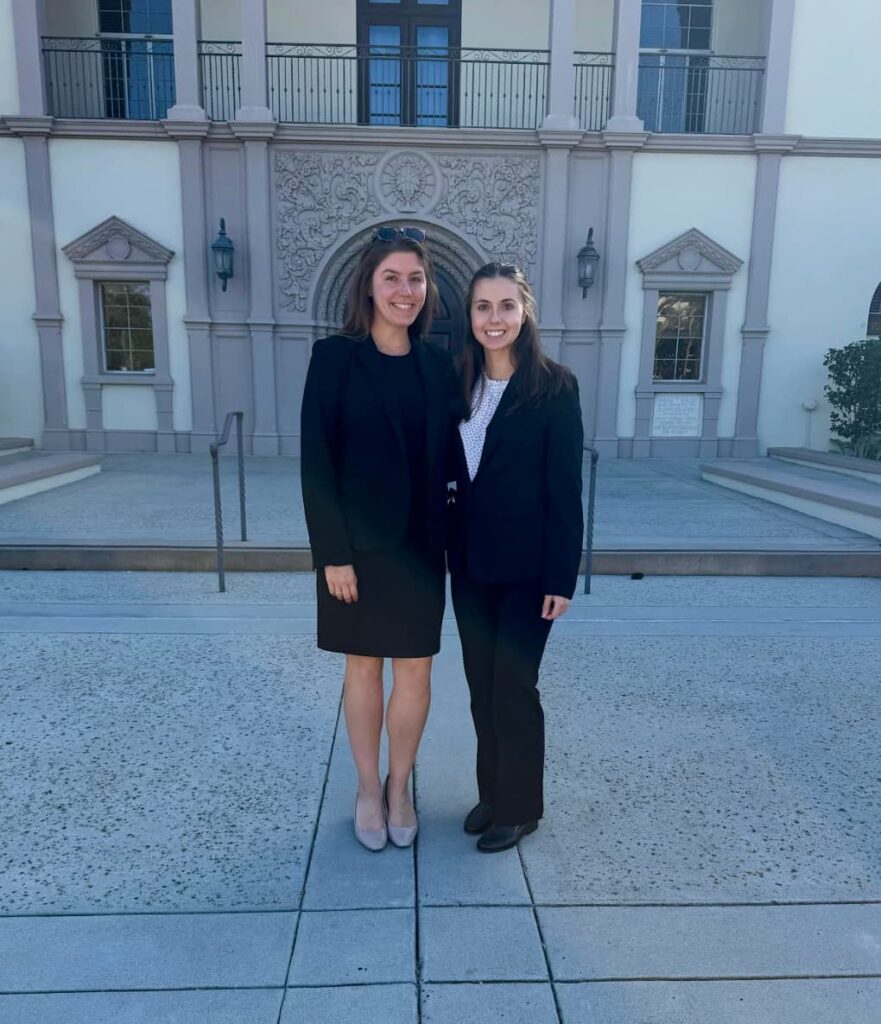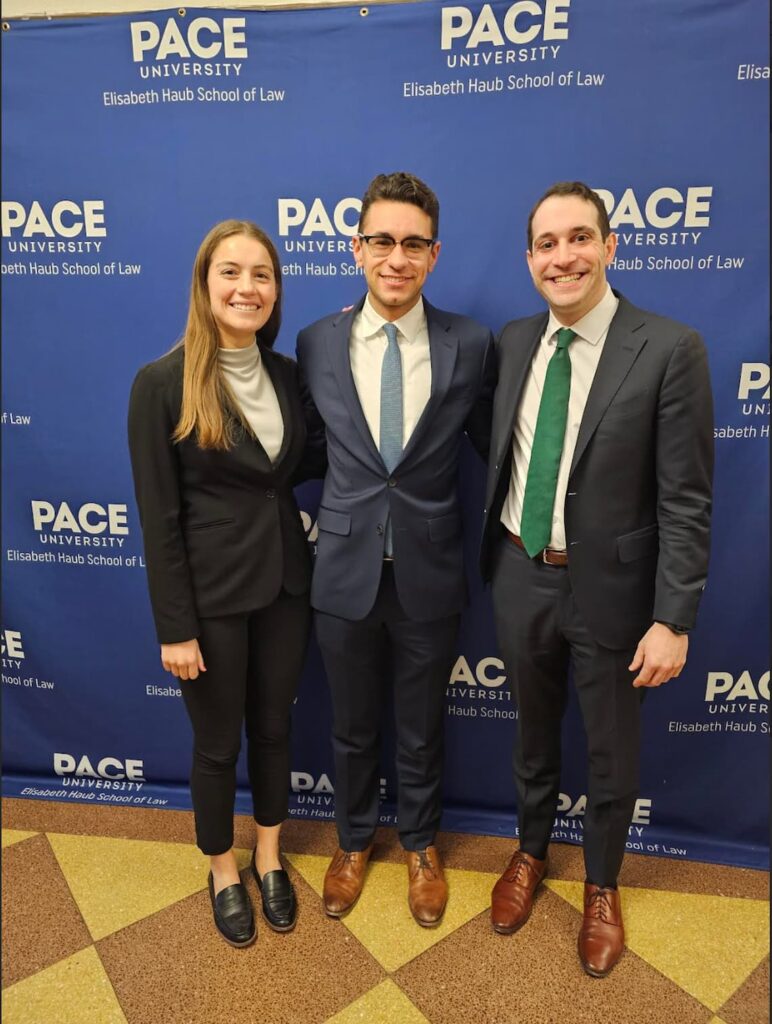Boston College Law School’s Board of Student Advisors hosted a banquet on April 22 for all of the school’s advocacy teams to celebrate a successful year. Rosemary Daly, the director of advocacy programs, opened the evening by recognizing the many accomplishments of various teams throughout the years. Accompanied by Thomas Carey ’65, Daly awarded two students—one mock trial and one moot court—with Best Oralist awards. This year, Caleb Brady ’25, and Isabella Burrell ’25, each received one of these awards for their advocacy on the National Mock Trial and National Moot Court teams.
Across the board, BC Law’s moot court and mock trial teams reached great heights during the 2024-25 academic year. The teams, which face competitors from all across the globe, are composed of law students from varying class years who are seeking to hone their advocacy and courtroom skills before graduation.
These successes are the result of team efforts between BC Law students, faculty, and alumni. Each team was required to digest a complex and hypothetical problem, write a brief or develop a case theory addressing the issues, and present an oral argument to panels of esteemed judges from throughout the legal community. In the end, all of BC Law’s teams proved to be strong competitors at the regional, national, and international levels.
National Mock Trial Team
The National Mock Trial team saw much success during their regional competition this semester hosted at the Woburn Superior Court. One team, composed of Bennett Demsky ’27 and Caleb Brady ’25, won its entire regional competition. The other, composed of Noah DeRossi ’25, Sarah Kaplan ’26, and Melanie Sztulman ’26, also won a majority of their ballots throughout the contest. Both teams received the highest scores for professionalism and collegiality, and Demsky was named one of two “best advocates” throughout the entire competition.
The team, coached by Steve Van Dyke ’08 and Julie Buszuwski, proceeded to the Texas Young Lawyers Association’s National Competition later in the spring. Only thirty of the 300 teams that compete advance to the national round.
The Mock Trial teams grappled with two problems throughout their competition season. At regionals, the teams presented compelling cases in a negligence car crash case between an eighteen-wheeler and a family car that resulted in the death of a child. At nationals, the advancing team presented a case resulting from a prison stabbing where correctional officers were unable to prevent the attack.
National Moot Court Team
The National Moot Court team, composed of JP LaBarge and Isabella Burrell and coached by Tom Carey ’65, found much success at the Vermont Law regional competition this past fall. LaBarge and Burrell advanced all the way to the final round of oral argument undefeated, ultimately placing second overall. The team also received the highest brief score out of all competitors from the weekend. The team qualified for the national rounds hosted by the New York Bar in the spring.
This year’s case problem presented two legal issues: (1) whether a website “tester” had Article III standing to sue an amusement park for alleged violations of the Americans with Disabilities Act (ADA), and (2) whether the amusement park lawfully excluded several children with disabilities from riding their attractions under Title III of the ADA.
National First Amendment Moot Court Team
The First Amendment Moot Court Team, coached by Rosemary Daly, achieved impressive results on behalf of BC Law this spring. The team, composed of 3Ls Jessica Parillo and Savannah Wormley, finished as quarterfinalists in the 75th Seigenthaler-Sutherland Cup National First Amendment Moot Court Competition. The two students advanced to the second day of competition, a feat achieved only by a handful of BC Law teams before them, to argue in the quarterfinal rounds at Catholic University Law School in Washington, DC.
The team’s problem contained both a Free Exercise Clause and a free speech question under the First Amendment. Wormley and Parillo argued about the application of First Amendment principles to the transfer of state park land containing Native American religious sites to a mining company. As their coach commented, the two were “simply outstanding” and proved to be “constitutional experts.”
National Criminal Procedure Moot Court Team
The National Criminal Procedure Team traveled across the country to compete in their competition this past fall, which was hosted by the University of San Diego School of Law. The team was composed of Allison Carvalho ’25 and Katherine Kossoy ’25. Coached by Professor Bob Bloom ’71, the team advanced to the quarterfinal round of the national competition.
This year, the Criminal Procedure Team worked through complex issues of constitutional liberty. The case presented two, distinct issues: (1) whether a police officer is entitled to qualified immunity when he is accused of violating a student’s First Amendment rights, and (2) whether a Fourth Amendment violation occurred when a police officer searched a student’s phone without a warrant.
National Environmental Law Moot Court Team
The National Environmental Moot Team combined their knowledge of scientific and environmental issues with a deep understanding of relevant law this past spring as they competed in Pace University’s Environmental Moot competition in White Plains, NY. The team, composed of 3Ls Korinna Garfield, Vincent Gritzuk, and Aaron Sege competed against 39 other teams from across the country. The team advanced to the semifinals, and Garfield received Best Oralist recognition for two of the three preliminary rounds.
The team, coached by Professor Harlan Doliner, faced challenging benches of environmental law professors and practitioners from around the country. They presented arguments on four distinct legal issues: (1) whether an environmental advocacy group had Article III standing to sue over violations of the Clean Water Act (CWA), (2) whether the group’s claims were barred by statutes of limitations, (3) whether the Environmental Protection Agency’s Water Transfers Rule is valid under the CWA, and (4) whether the Water Transfer Rule would allow the construction of a tunnel that might introduce pollutants into a body of water. In doing so, the team had to interpret the recent Supreme Court decision Loper Bright Enterprises v. Raimondo, a decision that overturned the prior Chevron deference to administrative agency’s decision-making.
Jessup International Law Moot Team
This year’s Jessup team, composed of Victoria Magali ’25, Qui “Kelly” Mai ’25, Keyon Rostamnezhad ’26, and Eliot Usherenko ’25, achieved international recognition during their competition season. Coached by alumnae Jeanne Semivan ’09 and Meaghan Luster ’20, and Professor David Wirth, the team presented arguments to a panel of esteemed judges on complex issues of international law. The team competed and qualified for the national competition earlier this year, and were fierce challengers in the international rounds in Washington, DC, this spring.
This year’s Jessup team presented on four distinct issues embedded in a hypothetical case problem: (1) the rights and obligations of various international community members when two different people claim to be the president of a state, (2) invocation of immunity for governmental officials who are accused of human rights violations, (3) legal consequences of receding coastlines caused by climate change for the maritime zones of coastal states, and (4) the interpretation of a compromissory clause in a international treaty.
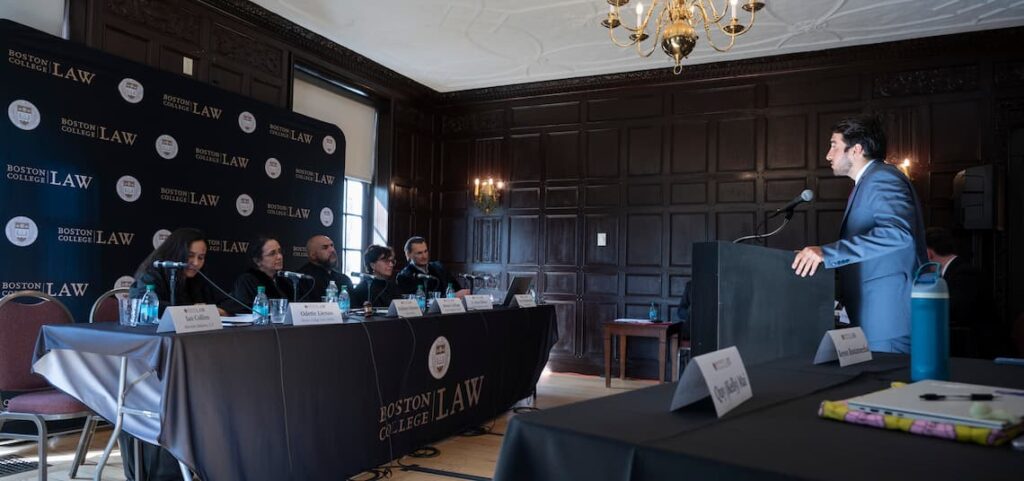
The successes of these students in the competitions illustrates BC Law’s commitment to developing its students’ courtroom competencies such as creating compelling presentations and answering questions under pressure to provide robust preparation for their future legal careers.
Top photograph by Andrés Leiva ’26


